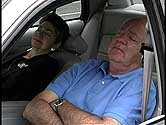 |
 |
 |
||
    |
||||
|
||||

Spring Forward? Plan Ahead
Sunday's time change can be easier with some advance preparation|
|
HealthDay
Sunday, March 8, 2009
 FRIDAY, March 6 (HealthDay News) -- You already know you'll lose an hour of precious sleep when the clocks shift forward into daylight saving time early Sunday morning.
FRIDAY, March 6 (HealthDay News) -- You already know you'll lose an hour of precious sleep when the clocks shift forward into daylight saving time early Sunday morning.
But you may not know that you could lose a lot more if you don't take steps to ease the adjustment, experts said.
"There are more accidents on the road within two days of daylight savings," said Shelby Harris, director of behavioral sleep medicine at Montefiore Medical Center's Sleep-Wake Disorders Center in New York City. "If there are that many accidents, think about how many other things are affected."
Indeed, research released last fall in the New England Journal of Medicine revealed a jump in the number of heart attacks following both semi-annual time changes, although it was more pronounced in the spring.
According to Dr. Aparajitha Verma, medical director of the Sleep Disorders Center at The Methodist Hospital System in Houston, normal circadian rhythms (your "body clock") typically take 24 to 48 hours to readjust to time changes.
The good news is that a few simple steps can help smooth the transition. Take this advice from the experts:
- Move your bedtime up gradually by about 15 minutes every day for three days or so before the change. But don't get excited by the prospect of more sleep -- in order to fully adjust, you'll also need to wake up 15 minutes earlier. "You're basically trying to get yourself to bed a little bit earlier than you would ordinarily to get you in sync with the time change," said Dr. Nicholas Rummo, director of the Center for Sleep Medicine at Northern Westchester Hospital Center in Mount Kisco, N.Y.
- Make sure you take into account your body's other rhythms as well. Eat dinner an hour earlier and don't nap in the afternoon or evenings just before the time change, Harris advised.
- Expose yourself to bright light first thing in the morning, either by standing close to a window or even going outside for a few moments. "That tends to move the internal rhythm a little bit forward," Rummo explained. "Daytime exercise in good light has the same effect."
- Avoid caffeine and alcohol for at least six hours before going to bed, Verma said.
- Adjust your clocks earlier in the day on Saturday, not as you're going to bed. "That way, you're going by the new time earlier in the day," Harris said.
- Try to keep a light schedule for a day or two after the change, limit strenuous activity, and avoid driving if you can (think public transportation).
And don't forget that the time change can be even more of a disruption for people who have underlying sleep disorders. These people should take extra special care.
"People with underlying sleep disorders -- for example, sleep apnea -- may need to be treated in conjunction with the time change," Verma said.
An estimated 50 million to 70 million Americans have some kind of sleep problem, according to the Institute of Medicine.
HealthDay
Copyright (c) 2009 ScoutNews, LLC. All rights reserved.
Related News:
More News on this Date
Related MedlinePlus Pages:
| Home | Health Topics | Drugs & Supplements | Encyclopedia | Dictionary | News | Directories | Other Resources | |
| Disclaimers | Copyright | Privacy | Accessibility | Quality Guidelines U.S. National Library of Medicine, 8600 Rockville Pike, Bethesda, MD 20894 National Institutes of Health | Department of Health & Human Services |
Date last updated: 09 March 2009 |
